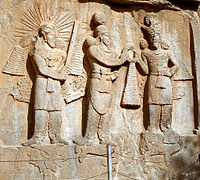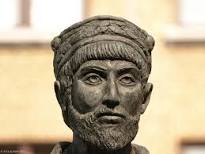A complex person and emperor of Rome, Julian’s biographers have described him as “a man of unusually complex character: he was ‘the military commander, the theosophist, the social reformer, and the man of letters’. He was the last non-Christian ruler of the Roman Empire, and it was his desire to bring the Empire back to its ancient Roman values in order to save it from dissolution. He purged the top-heavy state bureaucracy and attempted to revive traditional Roman religious practices at the cost of Christianity. His rejection of Christianity in favor of Neo-platonic paganism caused him to be called Julian the Apostate (Ἀποστάτης Apostates, ‘a person who has abandoned their religion, principles’)
“Julian’s personal religion was both pagan and philosophical; he viewed the traditional myths as allegories, in which the ancient gods were aspects of a philosophical divinity. The chief surviving sources are his works To King Helios and To the Mother of the Gods.
“He learned theurgy from Maximus of Ephesus, a student of Iamblichus; his system bears some resemblance to the Neoplatonism of Plotinus; Polymnia Athanassiadi has brought new attention to his relations with Mithraism, although whether he was initiated into it remains debatable; and certain aspects of his thought (such as his reorganization of paganism under High Priests, and his fundamental monotheism) may show Christian influence. Some of these potential sources have not come down to us, and all of them influenced each other, which adds to the difficulties.” For more on Julian visit here on Wikipedia.
Continuing from the historical account from Wikipedia, Julian “restored pagan temples which had been confiscated since Constantine’s time, or simply appropriated by wealthy citizens; he repealed the stipends that Constantine had awarded to Christian bishops, and removed their other privileges, including a right to be consulted on appointments and to act as private courts. He also reversed some favors that had previously been given to Christians.
“On 4 February 362, Julian promulgated an edict to guarantee freedom of religion. This edict proclaimed that all the religions were equal before the law, and that the Roman Empire had to return to its original religious eclecticism, according to which the Roman state did not impose any religion on its provinces.
“In his Tolerance Edict of 362, Julian decreed the reopening of pagan temples, the restitution of confiscated temple properties, and the return from exile of dissident Christian bishops. During Julian’s brief reign from 361-363 CE, his popularity among the people and the army indicated that he might have brought paganism back to the fore of Roman public and private life [keep this point in mind].
“In 363, not long before Julian left Antioch to launch his campaign against Persia, he ordered the Temple in Jerusalem to be rebuilt. A personal friend of his, Ammianus Marcellinus, wrote this about the effort:
‘Julian thought to rebuild at an extravagant expense the proud Temple once at Jerusalem, and committed this task to Alypius of Antioch. Alypius set vigorously to work, and was seconded by the governor of the province; when fearful balls of fire, breaking out near the foundations, continued their attacks, till the workmen, after repeated scorchings, could approach no more: and he gave up the attempt.’
The failure to rebuild the Temple has been ascribed to the Galilee earthquake of 363, and to the Jews’ ambivalence about the project. Sabotage is a possibility, as is an accidental fire. Julian’s support of Jews caused Jews to call him ‘Julian the Hellene.’
On 26 June 363, at the indecisive Battle of Samarra, received a wou nd from a spear that reportedly pierced the lower lobe of his liver, the peritoneum and intestines. Although the wound was not immediately deadly, Julian would die a few days later. In 364, Libanius stated that Julian was assassinated by a Christian who was one of his own soldiers.”
nd from a spear that reportedly pierced the lower lobe of his liver, the peritoneum and intestines. Although the wound was not immediately deadly, Julian would die a few days later. In 364, Libanius stated that Julian was assassinated by a Christian who was one of his own soldiers.”
Sassanian relief of the investiture of Ardashir II showing (right to left) Shapur II, Mithra, and Ahura Mazda above a defeated Julian, lying prostrate.
Rudolf Steiner states that “Julian was brought face to face with the deeper implications of the problem of evil and the relation of Christ Jesus to this problem. He hoped to find an answer through initiation into the Persian Mysteries [Mithraic and Zarathustrian] and to return to Europe with the solution. But unfortunately he fell by an assassin’s hand during the Persian campaign. It can be proved historically that this was the work of an adherent of Constantine. … In the following years the Augustinian principle triumphed – ideas that in any way echoed Manichaeism were forbidden, i.e. the inclusion of material ideas i spiritual thinking. The West therefore was driving to an abstract mode of thinking and in the course of time this mode of thinking permeated the whole of Western Europe. … Julian therefore was engaged in a titanic struggle. He finally attempted, by reviving Manichaeism, to bring about continuity in the evolution of the pagan Mysteries. … That he was doomed to fail was a necessity of the time. And we shall not understand the reason for his failure if we belittle his great achievements, if we fail to see him as a titanic figure, fighting for a realistic understanding of the relations between man and the universe. And it is of paramount importance today to recall these great moments in the historical evolution of the West. For we are living in an age from which we shall not emerge with a healthy outlook unless we make a fresh assessment of the aims of Julian the Apostate. It was not possible in his time – herein lies his great tragedy – to reconcile the old principle of initiation with the real essence of Christianity. Today this has become possible and we must not fail to translate the possibility into reality if the world and mankind are not to suffer evolutionary decline. People must realize the need for regeneration in all spheres of life and above all the crying need to restore  communication with the spiritual world.
communication with the spiritual world.
Coptic icon showing Saint Mercurius killing Julian.
Julian understood the greatness of the ancient mysteries and had hoped to restore them for the guidance of mankind. He could not fully grasp Christianity as already in his time much was deceived and lost.
